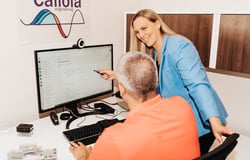Roles and Responsibilities
- Create and enhance software tool capability for fatigue, creep, fracture mechanics, and engine dynamics.
- Support and troubleshoot engineering software across various deployment areas.
- Coordinate with software users to prioritize tool development needs.
- Perform rigorous testing on software tools that have been developed, modified, or enhanced to ensure quality and reliability.
- Develop and apply specialized knowledge in the discipline, serving as a resource for best practices and quality standards. Stay informed on the latest technical advancements and contribute to strategy and policy development to ensure successful delivery of objectives.
- Possess in-depth knowledge of best practices and how the function integrates with other areas, such as materials, heat transfer, impact dynamics and aeromechanics. Maintain awareness of market competition and factors that differentiate the organization.
- Use technical expertise and data analysis to solve moderately complex problems in operational/product management, manufacturing, technology, or engineering. Apply innovative perspectives to existing solutions and leverage internal and limited external resources to inform decisions.
- Acts as a resource for colleagues. May lead functional teams or projects with minimal resource requirements, risk, and/or complexity. Communicates difficult concepts and may influence others' options on topics; works to build consensus. Developing persuasion skills required to influence others on topics within field.
Required Qualifications
- Bachelor's degree (or higher) in mechanical or aerospace engineering from a credited university or college
- Minimum of 5 years of experience in software engineering
- Legal authorization to work in the U.S. is required. We will not sponsor individuals for employment visas, now or in the future, for this job opening.
Desired Characteristics
- Master's degree in engineering from an accredited university or college
- Bachelor's degree (or higher) in mechanical or aerospace engineering from a credited university or college with at least 8 years of experience in the field.
- Experience using FEA based tools (NASTRAN, ABAQUS or ANSYS)
- Fundamental understanding of fatigue, creep, linear elastic fracture mechanics, structural vibration and rotor dynamics
- Computer programming skills – preferably with Fortran and Python
This role requires access to U.S. export-controlled information. Therefore, for applicants who are not U.S. lawful permanent residents, U.S. Citizens, or have been granted asylee or refugee status (i.e., not a protected individual under the Immigration and Naturalization Act, 8 U.S.C. 1324b(a)(3), otherwise known as a U.S. Person), employment will be contingent on the ability to obtain authorization for access to U.S. export-controlled information from the U.S. Government.
GE Aerospace offers a great work environment, professional development, challenging careers, and competitive compensation. GE Aerospace is an Equal Opportunity Employer. Employment decisions are made without regard to race, color, religion, national or ethnic origin, sex, sexual orientation, gender identity or expression, age, disability, protected veteran status or other characteristics protected by law.
GE Aerospace will only employ those who are legally authorized to work in the United States for this opening. Any offer of employment is conditioned upon the successful completion of a drug screen (as applicable).
Relocation Assistance Provided: Yes
Top Skills

What We Do
A new era is here, and we want you to be a part of it. We will now be sharing our content on our respective GE Aerospace and GE Vernova pages. Be sure to follow each to keep up with the future of aviation and energy.










